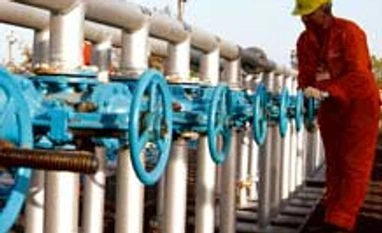Gas shortage in the six resource-rich Gulf Cooperation Council (GCC) countries will become more pronounced by 2015 as demand stays strong and supply struggles to keep pace, according to a report.
Increasing power consumption, depleting oil fields, gas exploration and long-term gas export commitments have limited the local supply of gas in the region, a recent report titled 'Gas shortage in the GCC - How to Bridge the Gap', published by global consultancy firm, Booz & Company, suggests.
The GCC countries can address the supply-demand imbalance by raising local gas prices gradually, improving energy efficiency and investing in alternative methods to overcome the shortage, it said.
'The GCC's gas shortage can be resolved. But timing is crucial and waiting for solutions to materialise might mean that GCC countries will have to burn more valuable liquid fuels to meet demand,' said Robin Mills, head of consulting at Manaar Energy.
According to Mills, governments need a mix of short-term and long-term measures to address the gas shortage. They need to invest in new developments to increase production, increase local gas prices steadily to encourage efficiency, and expand the use of alternative sources in the energy mix.
In an effort to bring the gas sector back on track, Mills will outline recent developments in the GCC gas and power sector, and discuss the regional gas supply outlook and its impact on prices at the second 'Power + Water Leader's Forum' to take place on September 23 in Abu Dhabi.
The conference runs alongside the 'Power + Water Middle East' exhibition, which takes place from September 23-25, and will provide an ideal platform for experts to discuss sustainable best practices and innovative solutions across two of the region's burgeoning sectors.
Anita Mathews, director of Informa Energy Group, which is organising 'Power + Water Middle East' said an alternative energy source now making strides in the region is nuclear.
Held in strategic partnership with the Abu Dhabi Water & Electricity Authority (ADWEA), 'Power + Water Middle East' is supported by the Society of Engineers, UAE and Confederation of Indian Industry (CII), who will be organising a government-supported national pavilion at the event.
Increasing power consumption, depleting oil fields, gas exploration and long-term gas export commitments have limited the local supply of gas in the region, a recent report titled 'Gas shortage in the GCC - How to Bridge the Gap', published by global consultancy firm, Booz & Company, suggests.
The GCC countries can address the supply-demand imbalance by raising local gas prices gradually, improving energy efficiency and investing in alternative methods to overcome the shortage, it said.
Also Read
The GCC, a political and economic union of Arab states bordering the Persian Gulf, has Bahrain, Kuwait, Oman, Qatar, Saudi Arabia and the United Arab Emirates as its members.
'The GCC's gas shortage can be resolved. But timing is crucial and waiting for solutions to materialise might mean that GCC countries will have to burn more valuable liquid fuels to meet demand,' said Robin Mills, head of consulting at Manaar Energy.
According to Mills, governments need a mix of short-term and long-term measures to address the gas shortage. They need to invest in new developments to increase production, increase local gas prices steadily to encourage efficiency, and expand the use of alternative sources in the energy mix.
In an effort to bring the gas sector back on track, Mills will outline recent developments in the GCC gas and power sector, and discuss the regional gas supply outlook and its impact on prices at the second 'Power + Water Leader's Forum' to take place on September 23 in Abu Dhabi.
The conference runs alongside the 'Power + Water Middle East' exhibition, which takes place from September 23-25, and will provide an ideal platform for experts to discuss sustainable best practices and innovative solutions across two of the region's burgeoning sectors.
Anita Mathews, director of Informa Energy Group, which is organising 'Power + Water Middle East' said an alternative energy source now making strides in the region is nuclear.
Held in strategic partnership with the Abu Dhabi Water & Electricity Authority (ADWEA), 'Power + Water Middle East' is supported by the Society of Engineers, UAE and Confederation of Indian Industry (CII), who will be organising a government-supported national pavilion at the event.
)